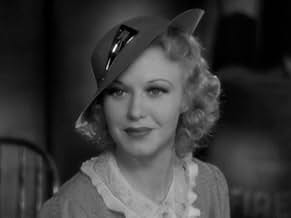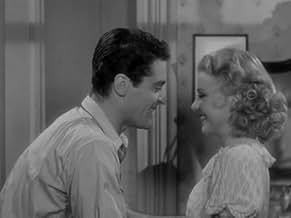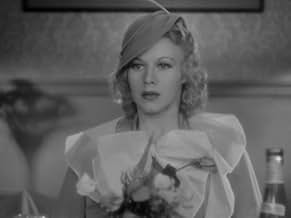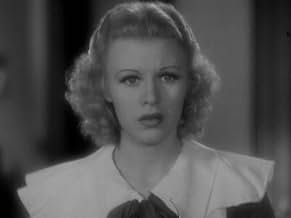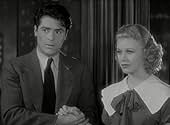Ajouter une intrigue dans votre langueRejected as an immigrant because he doesn't have the required $200, a Czech immigrant jumps ship and is befriended by a chorus girl and becomes a taxi driver.Rejected as an immigrant because he doesn't have the required $200, a Czech immigrant jumps ship and is befriended by a chorus girl and becomes a taxi driver.Rejected as an immigrant because he doesn't have the required $200, a Czech immigrant jumps ship and is befriended by a chorus girl and becomes a taxi driver.
- Réalisation
- Scénario
- Casting principal
- Récompenses
- 2 victoires au total
Richard Alexander
- Man at East River
- (non crédité)
Irving Bacon
- Counterman
- (non crédité)
Wade Boteler
- Customs Inspector
- (non crédité)
A.S. 'Pop' Byron
- Policeman Writing Down Charges
- (non crédité)
Spencer Charters
- Marriage License Clerk
- (non crédité)
Martin Cichy
- Policeman at Bar
- (non crédité)
Avis à la une
A sensitive and skillful performance by Francis Lederer makes this minor film enjoyable enough to sit through. He plays a Czech immigrant who escapes deportation back to his native land by jumping ship, ending up penniless but full of spirit on the bustling streets of New York City. Soon he encounters a kindly chorus girl (Ginger Rogers) who takes him home and with the help of her 11-year-old brother helps him find work. The dialogue is peppered with lines about the state of the economy in 1934, an understanding of how difficult it was to find a job and even wry commentary on New Deal federal policies (someone on the writing team had to have been a Republican). Otherwise, the impact thins as the plot thickens. We are supposed to believe, in line with the moral code of movies at that time, that Lederer willingly agrees to sleep on the roof of Rogers's apartment building for months, coming inside to the stairs only when it rains. Somehow the summery weather never seems to change even though a significant stretch of time evidently passes during which he rises from newspaper seller to taxi driver (even "scabbing" during a strike), sporting an ever-improving wardrobe, savings account and self-confidence. To top it all off, he is helped out of legal snags relating to his immigration status (and marriage to Rogers) by the convenient fact that Rogers just happens to be very good friends with a sweet Irish cop who has connections in the municipal power structure; call it corruption for good ends.
Lederer's progress through the streets of New York City is represented by crudely staged actions in front of rear projections. Interior scenes, however, are handled imaginatively and catch the eye. Ginger Rogers is only secondary here, but when you see how many films she cranked out during this period, you have to allow her some slack. Lederer gets top billing and deserves it.
Lederer's progress through the streets of New York City is represented by crudely staged actions in front of rear projections. Interior scenes, however, are handled imaginatively and catch the eye. Ginger Rogers is only secondary here, but when you see how many films she cranked out during this period, you have to allow her some slack. Lederer gets top billing and deserves it.
Honestly, I never really cared for the roles Francis Lederer played, until I watched this film. He is just perfect as the optimistic Czech immigrant, Karel Novak, who is so glad to be landing in America. The Great Depression doesn't scare him, he's willing to do anything and figures he can triumph over any adversity. Fate is about to hand him that chance as he faces just about every adversity an immigrant can face. First he arrives in New York with less than the money required to get in - he thought it was fifty dollars, instead it is two hundred. Instead of being deported, he jumps out of the window of the cabin he is confined in and gets ashore before he can be discovered missing.
Hungry and broke, Karel is befriended by chorine Sylvia (Ginger Rogers), when she spots him chowing down on the donuts and coffee that she and the other girls in the show were breakfasting on. Although not dismal, Sylvia is realistic about how hard times are. An orphan and only 19 herself, Sylvia is taking care of a younger brother, Frank, who is going to be put in an orphanage if he skips school again. Frank is not skipping school to hang out with some local gang though, he just wants to work selling more papers to help out his big sister whom he can see is working so hard to support them both. Karel helps Sylvia see life a bit differently, through the eyes of an immigrant who is so happy to be in bustling New York where he believes anybody can become a millionaire.
So Frank, Sylvia, and Karel become a real threesome. Karel sells papers during the day, then gets a job as a taxi driver, and things are looking up. He's hoping to get the two hundred dollars together to give the immigration people before they catch up to him, and his bank balance is rising. But then everything begins to go wrong. There is a taxi strike and Karel is forced off the job with no pay while the strike drags on. The show Sylvia was dancing in closes, and Karel offers to help out and plunders his entire bank account covering living costs. Finally, Frank skips school AGAIN to sell papers and help out, but this time he is going to be sent to the orphanage. Worst of all a crooked lawyer plays on Karel's lack of knowledge of the law and sells out Karel to the immigration people, so he is facing deportation again.
So how is this not the most depressing film ever? Because it is a love story - that of two people trying to make it in New York in slim times - Karel and Sylvia - slowly and convincingly falling in love and having great chemistry together. It's also the story of an unconventional family unit of three - Karel, Sylvia, and Frank - who would do anything for one another. I'll let you watch and see how this all works out.
It's a heartwarming tale of a different New York from decades ago - one full of boarding houses, cops on the beat who knew everyone in the neighborhood, when donuts and coffee were considered a hearty breakfast, and people largely had good intentions. It's one of my sentimental favorites.
Hungry and broke, Karel is befriended by chorine Sylvia (Ginger Rogers), when she spots him chowing down on the donuts and coffee that she and the other girls in the show were breakfasting on. Although not dismal, Sylvia is realistic about how hard times are. An orphan and only 19 herself, Sylvia is taking care of a younger brother, Frank, who is going to be put in an orphanage if he skips school again. Frank is not skipping school to hang out with some local gang though, he just wants to work selling more papers to help out his big sister whom he can see is working so hard to support them both. Karel helps Sylvia see life a bit differently, through the eyes of an immigrant who is so happy to be in bustling New York where he believes anybody can become a millionaire.
So Frank, Sylvia, and Karel become a real threesome. Karel sells papers during the day, then gets a job as a taxi driver, and things are looking up. He's hoping to get the two hundred dollars together to give the immigration people before they catch up to him, and his bank balance is rising. But then everything begins to go wrong. There is a taxi strike and Karel is forced off the job with no pay while the strike drags on. The show Sylvia was dancing in closes, and Karel offers to help out and plunders his entire bank account covering living costs. Finally, Frank skips school AGAIN to sell papers and help out, but this time he is going to be sent to the orphanage. Worst of all a crooked lawyer plays on Karel's lack of knowledge of the law and sells out Karel to the immigration people, so he is facing deportation again.
So how is this not the most depressing film ever? Because it is a love story - that of two people trying to make it in New York in slim times - Karel and Sylvia - slowly and convincingly falling in love and having great chemistry together. It's also the story of an unconventional family unit of three - Karel, Sylvia, and Frank - who would do anything for one another. I'll let you watch and see how this all works out.
It's a heartwarming tale of a different New York from decades ago - one full of boarding houses, cops on the beat who knew everyone in the neighborhood, when donuts and coffee were considered a hearty breakfast, and people largely had good intentions. It's one of my sentimental favorites.
ROMANCE IN MANHATTAN (1935) is an immigrant story. Karel Novak (Francis Lederer) comes to America -- "The Land of Opportunity" -- with dreams of becoming a millionaire. He intends to work hard and has already learned to speak English. Right off the boat, he seems an ideal candidate for entry into the country. But the money he's saved is no longer enough to satisfy the immigration fee, which has risen from fifty to two hundred dollars. And so Karel must be sent back to Czechoslovakia, where he may never save enough money for a return trip to the States. Desperate, Karel escapes his deportation and tries to live the American Dream as an illegal alien in New York City.
Francis Lederer is supremely likable as Karel Novak, charming and optimistic, though naïve. Karel sees America as the land of his dreams, a place that could well be Heaven. He gets giddy with excitement just seeing the Manhattan skyline lit up at night. Unfortunately Karel enters an America that is mired in a Depression, and millionaires -- and jobs, for that matter -- are hard to come by.
Ginger Rogers plays Sylvia, a chorus girl who lives with her little brother, a paper boy when he's not in school (or vice versa). The two earn what they can and take care of each other in these tough times. Sylvia comes to Karel's aid when he's penniless and homeless and soon he's like a member of the family. Sylvia's brother gets Karel a job selling newspapers and Sylvia lets him sleep on the roof of their apartment building. After a while Karel gets a job driving a taxi and starts saving up money to square things with the immigration office. But when Sylvia loses her job, Karel dips into his savings to help out and soon he's back where he started.
In the meantime Karel and Sylvia fall in love. And really who can blame them? But Karel's status as an illegal immigrant is going to come back to haunt him and he knows it. And while Karel's struggling with that, Sylvia's trying to keep her brother from being taken away from her and placed in an orphan asylum.
ROMANCE IN MANHATTAN is a winner and I don't know how it's slipped under the radar. Francis Lederer and Ginger Rogers are a lovable pair and the film's got Depression-era drama around every corner. Our poor heroes are handed tough break after tough break, just trying to make a go of the "American Dream", but they take each blow on the chin, determined to get by somehow. Karel, the eternal optimist, faces adversity with a smile. It's a cute love story wrapped inside a social drama, and a pleasant watch the whole way through.
The question posed at the climax of the film is whether Karel Novak, being a hard-working and respectable young man, deserves any breaks from the immigration office. Sure, he's in the country illegally, but can something be worked out for the poor guy? It's an ethical problem that can be seen as black and white or as shades of gray. The film makes its decision on the matter and I won't spoil it.
Francis Lederer is supremely likable as Karel Novak, charming and optimistic, though naïve. Karel sees America as the land of his dreams, a place that could well be Heaven. He gets giddy with excitement just seeing the Manhattan skyline lit up at night. Unfortunately Karel enters an America that is mired in a Depression, and millionaires -- and jobs, for that matter -- are hard to come by.
Ginger Rogers plays Sylvia, a chorus girl who lives with her little brother, a paper boy when he's not in school (or vice versa). The two earn what they can and take care of each other in these tough times. Sylvia comes to Karel's aid when he's penniless and homeless and soon he's like a member of the family. Sylvia's brother gets Karel a job selling newspapers and Sylvia lets him sleep on the roof of their apartment building. After a while Karel gets a job driving a taxi and starts saving up money to square things with the immigration office. But when Sylvia loses her job, Karel dips into his savings to help out and soon he's back where he started.
In the meantime Karel and Sylvia fall in love. And really who can blame them? But Karel's status as an illegal immigrant is going to come back to haunt him and he knows it. And while Karel's struggling with that, Sylvia's trying to keep her brother from being taken away from her and placed in an orphan asylum.
ROMANCE IN MANHATTAN is a winner and I don't know how it's slipped under the radar. Francis Lederer and Ginger Rogers are a lovable pair and the film's got Depression-era drama around every corner. Our poor heroes are handed tough break after tough break, just trying to make a go of the "American Dream", but they take each blow on the chin, determined to get by somehow. Karel, the eternal optimist, faces adversity with a smile. It's a cute love story wrapped inside a social drama, and a pleasant watch the whole way through.
The question posed at the climax of the film is whether Karel Novak, being a hard-working and respectable young man, deserves any breaks from the immigration office. Sure, he's in the country illegally, but can something be worked out for the poor guy? It's an ethical problem that can be seen as black and white or as shades of gray. The film makes its decision on the matter and I won't spoil it.
Ginger Rogers and Francis Lederer have "Romance in Manhattan" in this 1935 film directed by Stephen Roberts. The movie also features Jimmy Butler, Sidney Toler, and Donald Meek.
The handsome Lederer plays Karel Novak, an immigrant to the U.S. who is sent back as soon as he arrives because he doesn't have the required $200. He thought he only needed $50. On the return ship to his native Czechoslovakia, he jumps ship, but loses his wallet in the process. Fortunately he meets a chorus girl, Sylvia, when he's trying to steal food. He winds up sleeping on the roof of the apartment building where Sylvia lives with her brother Frankie (Butler). Frankie helps Karel get a job delivering newspapers. Later on, Karel becomes a cab driver, all with the goal of earning the necessary $200 so he can stay in America.
What a wonderful movie, very heartwarming, with fine performances, especially by Lederer. Irving Thalberg intended to make Lederer a huge star in the U.S., but he died, and it didn't happen. Nevertheless, the European star made some fine films both in Europe and here, moved into television, started an acting school, and taught acting until he died at age 100. When he worked with Louise Brooks in Die Büchse der Pandora in 1929, he knew no English, and Brooks knew no German. Here he gives a witty, charming and sincere performance as Karel.
Ginger Rogers looks beautiful as Sylvia - she was 24 - and gives an excellent performance, sharing good chemistry with both Lederer and Butler.
Very sweet film, well directed, not cloying or overly sentimental. Loved it.
The handsome Lederer plays Karel Novak, an immigrant to the U.S. who is sent back as soon as he arrives because he doesn't have the required $200. He thought he only needed $50. On the return ship to his native Czechoslovakia, he jumps ship, but loses his wallet in the process. Fortunately he meets a chorus girl, Sylvia, when he's trying to steal food. He winds up sleeping on the roof of the apartment building where Sylvia lives with her brother Frankie (Butler). Frankie helps Karel get a job delivering newspapers. Later on, Karel becomes a cab driver, all with the goal of earning the necessary $200 so he can stay in America.
What a wonderful movie, very heartwarming, with fine performances, especially by Lederer. Irving Thalberg intended to make Lederer a huge star in the U.S., but he died, and it didn't happen. Nevertheless, the European star made some fine films both in Europe and here, moved into television, started an acting school, and taught acting until he died at age 100. When he worked with Louise Brooks in Die Büchse der Pandora in 1929, he knew no English, and Brooks knew no German. Here he gives a witty, charming and sincere performance as Karel.
Ginger Rogers looks beautiful as Sylvia - she was 24 - and gives an excellent performance, sharing good chemistry with both Lederer and Butler.
Very sweet film, well directed, not cloying or overly sentimental. Loved it.
Francis Lederer spent years of work to come up with the $50 he has to have to enter the United States as an immigrant. He even built up an $8 reserve on top of that. When the authorities at Ellis Island tell him it's been raised to $200, he's disconsolate. He jumps out of the porthole and swims, exhausted to land.... and discovers he has lost his $58. He wanders the street and sneaks into the back of a burlesque house, where Ginger Rogers stakes him to a couple of doughnuts and a couch in the room she share with her brother, Jimmy Butler.
It's a very sweet movie, with the men who administer the laws not cruel, not impatient, just doing their jobs. Certainly how you read that depends a lot on how you feel about immigration, but to me that makes it worse; Lederer is so anxious to be an American, that only the cruelest person could deny him that boon; fortunately for these uncaring bureaucrats, it's not them, it's rules. Under the Production Code, there was no way they could be villains. The fact they were sending him back to a Europe that in four years would be at war would not occur to them, and if it did, what could they do about it? At least in the movie, it turns out well for Lederer.
With J. Farrell MacDonald, Helen Ware, Donald Meek, Sidney Toler and Oscar Apfel.
It's a very sweet movie, with the men who administer the laws not cruel, not impatient, just doing their jobs. Certainly how you read that depends a lot on how you feel about immigration, but to me that makes it worse; Lederer is so anxious to be an American, that only the cruelest person could deny him that boon; fortunately for these uncaring bureaucrats, it's not them, it's rules. Under the Production Code, there was no way they could be villains. The fact they were sending him back to a Europe that in four years would be at war would not occur to them, and if it did, what could they do about it? At least in the movie, it turns out well for Lederer.
With J. Farrell MacDonald, Helen Ware, Donald Meek, Sidney Toler and Oscar Apfel.
Le saviez-vous
- AnecdotesGinger Rogers's character in the film is 19 years old. Actually, at the time, she was 23 years old.
- GaffesAt the 01:11:20 mark the shadow of the boom mic can be seen moving on the wall behind the man on the phone.
- Citations
Karel Novak: [Enthusiastically] Smell the river!
Sylvia Dennis: [Sarcastically] You take another deep breath like that, and you'll kill yourself.
- ConnexionsReferences Follow the Leader (1930)
- Bandes originalesAfter You've Gone
(1918) (uncredited)
Music by Turner Layton and Henry Creamer
Background music at the theater
Meilleurs choix
Connectez-vous pour évaluer et suivre la liste de favoris afin de recevoir des recommandations personnalisées
Détails
- Date de sortie
- Pays d’origine
- Langues
- Aussi connu sous le nom de
- El embrujo de Manhattan
- Lieux de tournage
- Société de production
- Voir plus de crédits d'entreprise sur IMDbPro
- Durée1 heure 17 minutes
- Couleur
- Rapport de forme
- 1.37 : 1
Contribuer à cette page
Suggérer une modification ou ajouter du contenu manquant

Lacune principale
By what name was Romance in Manhattan (1934) officially released in India in English?
Répondre

